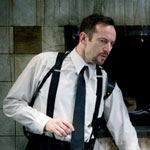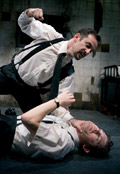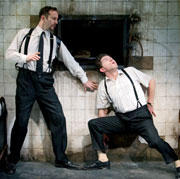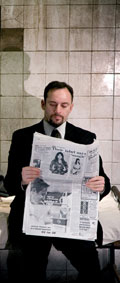London
Theatre
Guide
2/14/2007
The Big
Interview: Jason Isaacs
It is a cold
winter's day, the wind is whistling through the trees and the
light is fading. It is not the time to be meeting either a hit
man or one of the most evil wizards around. Luckily Matthew Amer
was meeting an actor who plays such parts, not the real thing.
Jason Isaacs is currently appearing in Harold Pinter's
The Dumb Waiter
at
Trafalgar Studio 1,
but took time out of his hectic rehearsal period to talk to
officiallondontheatre.
 |
Jason Isaacs stars in
The Dumb Waiter |
"Why didn't I know Harold
Pinter wrote very funny plays?" asked Jason Isaacs of his friend
and The Dumb Waiter director Harry Burton when he first read the
play's script. It is a good question and one answered by the
fact that Isaacs had seen some very bad student productions. It
takes something special to tempt the actor, who made his name on
film and television, onto the stage, but Burton's retort "I know
it's funny, and I've got Lee Evans to be in it with you if you
want to do it" sealed the deal. Only then did he break the news
that they had about six weeks to put the production together.
It is indeed a rare
occurrence to see Isaacs on stage, while you can't miss him on
screen. Complete with flowing peroxide locks and chilling stare
he is best known as the malicious Lucius Malfoy in the Harry
Potter films, though he most recently appeared on screens as the
lead in BBC mini-series The State Within.
Now he has brought his
frosty glare to the stage, starring as Ben in Pinter's tale of
hit men The Dumb Waiter, and he is thoroughly enjoying the
experience of working with Evans: "If you've [only] ever seen
him on screen do stand-up you have missed something magical," he
says, slightly in awe, "because he has a gift with regards to
working and using and relating to an audience that is only
apparent live."
"It was
like he was channelling some divine force"
Those of you who have ever
seen Evans's stand-up routines, live or otherwise, probably
imagine him to be something like an excitable, sweaty whippet
trying to chase eight rabbits simultaneously. And though Isaacs
confirms he has "enough energy for a 150-piece orchestra," this
is the merest fraction of Evans as a person: "It became very
clear to me on the first morning," says Isaacs, "that he might
share an accent with, but that's all he shares in common with
Lee Evans the public persona. He takes some tiny part of who he
really is and he ratchets it up 20,000% to make some of his
comedy, but that's nothing to do with who he is. He's far more
familiar with Pinter and Beckett than I am. He's a very
accomplished musician. He's very sensitive, he's very serious
about being an actor, he's very open to the world, he's
incredibly kind. He's got huge resources; we're only seeing the
tip of the iceberg so far, as an actor, as a performer, as a
writer, all round in every way." To be honest, it could get to
almost sickening levels of admiration were it not for the fact
that Isaacs comes across so sincerely when talking about his
co-star, and that he admits that: "It took a little bit of time
for me to shake all the things I thought I knew about him aside
and deal with the person that was in front of me in rehearsals."
 |
Isaacs teaches
Evans a lesson |
Former law student Isaacs
he studied at Bristol before pursuing his love of acting at the
Central School of Speech and Drama is less enthralled with
theatre as an art form than many of his peers. Since turning
professional he has made over 30 films and appeared in a number
of high profile television series. By contrast he has only taken
to the stage on a handful of occasions. He gives two reasons for
this: he finds it frustrating and he was spoiled by a previous
experience.
"When it comes to great
plays, like Angels In America," he says, "there's no part of you
that wants to change a single syllable of it. When it comes to
moments in other things that clearly, no matter how much you've
rehearsed it or played it, are not quite right, it's purgatory
to be up there on stage knowing you're not quite giving an
audience what they deserve or need, or what they hoped for when
they booked their baby sitter, bought their expensive ticket and
paid their 20 quid in the NCP."
It is Angels In America,
in which he played Louis Ironside when it premiered at the
National in 1993, that Isaacs feels has left him with the
nagging feeling that nothing else will ever be as good. "There
was a fax machine in the rehearsal room," he explains. "It was
one of those, in the old days, when there was a roll of paper,
not separate sheets, and this thing would spew out 10 foot of
text. We'd gather round it and it would say 'Scene 23, 24, 25
cut, scene 36, 38
' and you'd go 'Oh no, fantastic work', and it
would go 'replace with this
' and something would emerge. It was
like [writer Tony Kushner] was channelling some divine force,
because it was genius. I thought it was all genius. Nothing, for
me, that I've done on stage has ever worked on so many levels."
"It's
obscene that I get paid, people should complain"
It is a shame he does not
do more, as he clearly gets a kick from it. As he talks about
waiting in the wings he explains how "the adrenalin flows and it
feels stupidly and unjustifiably terrifying; you're not about to
jump out of a helicopter in Iraq or anything, but it feels
terrifying because there's this contract that no-one's going to
speak or interrupt you and you're not going to break out of your
character or forget your lines."
 |
Isaacs and Evans
distrust the
mysterious serving hatch |
On screen Isaacs is electric.
He has one of those personas that magnetically draw your eyes
towards him; his eyes pierce. In person he is strangely normal.
It would be easy to walk past him in the street without giving
him a second look, and his features seem softer than celluloid
would have you believe.
He has normal problems
too. Far from being among the echelon of actors that can pick
and choose their work, Isaacs is insistent that though it may
look that way, he has his fair share of not knowing where the
next pay cheque is coming from, or watching the bank balance
slowly dwindle as prospects seem scarce. This is the reason he
commutes to America to work. This year he will spend six months
in Rhode Island filming American drama series The Brotherhood,
in which he plays the gangster brother of a politician. Until
now, his children have always traveled with him, but now they
are a little older, it could mean leaving them behind; a
prospect he is not looking forward to: "It's a horrible thing to
have to deal with, but you know, I'm a gypsy, actors have to go
where the work is. When it looks like it's taking too big a
toll, I'll have to stop doing it. Being a good Dad is far more
important than being a good actor."
A common misconception
about Isaacs is that he generally plays the baddies. It is not
true, though being a Brit in Hollywood he has had his fair share
of manic-laughing, power-hungry megalomaniacs thrust his way.
"They're pretty lovely, juicy parts," he says. "They pay very
nicely, they're often very good fun, they leave you alone, you
get the best scenes in the film." But as to playing lots of
them, it is just not the case. He was offered lots of them
following his portrayal of brutal British commander Colonel
Tavington in The Patriot. He chose to play a drag queen in Sweet
November instead. Isaacs is not worried about typecasting, in
fact he points out that it doesn't actually exist. Rather
type-offering exists and actors don't have to take the work if
they don't want it. "People keep offering you the same job," he
states, "there are worse things in life."
"It's nice
to just be unalloyed Nazi evil"
When he did return to the
scowling world of the evil-doer, it was in the most high profile
of ways in the most high profile of films; playing prominent
Deatheater Lucius Malfoy in the Harry Potter series. While
talking about this role, Isaacs turns into what can only be
described as a big kid: "It's obscene that I get paid," he
beams, "people should complain. I've got a four-year-old, she's
got a dress-up box in her room and nothing touches Lucius Malfoy.
She's got fairies and wizards and witches and superheroes, and
nothing touches it. I get there and I say 'Can I have a cane
with a wand inside it? Can I have a cape? Do you think I could
have a belt with a snake's head on it? Do you think I can blast
that wall and it blows open and I walk through it?' It's absurd
a man of my age doing that stuff. And then you get there and
realise you're doing scenes with Gary Oldman and Helena Bonham
Carter. I look at the call sheet and they're going to be there
today, I'm going to get to talk to them. Before you know it
you're having lunch and sharing HP sauce. It's fantastic."
 |
Isaacs takes a break
to read the newspaper |
"If you're someone like me,"
he continues "who finds work enjoyably tortured I'm constantly
niggling away trying to make it better and realer and more
three-dimensional it's nice to leave all that at home and turn
up at Harry Potter and just be unalloyed Nazi evil."
Simple pleasures, it
seems, light up Isaacs's world, just like the rest of us. Not
the simple pleasures of caramel biscuits though a plate of
those remain untouched on the table before us. His ambitions are
similarly low key and relate to the pursuits of showbiz greats
such as Bruce Forsyth, Jimmy Tarbuck and Ronnie Corbett: the
charity golf tournament. "Once you have kids, he explains
excitedly, "you can't say 'sorry darling, I'm just off out for
seven hours', you just can't do it. But if you say 'I'm just off
out for seven hours, I'm helping to cure childhood diseases',
no-one can really argue with you."
Unlike Brucey, Tarbey et
al, Isaacs has his eyes on a much wider goal. While celebrity
golf is at the forefront of his mind, there are other sports in
which he would like an excuse to play against the great and the
good. He would happily dabble at snooker, but would really enjoy
some celebrity tennis action. "I've heard around that Lenny
Henry and Dawn French have an annual tennis tournament," he
confides, "and I once heard a rumour that Alan Rickman is very
good I dont know if any of this is true and every time I've
been in the same place as one of them I've subtly tried to
project into their mind so that they turn to me and go 'Jason,
do you play tennis?', but it's never happened yet." |